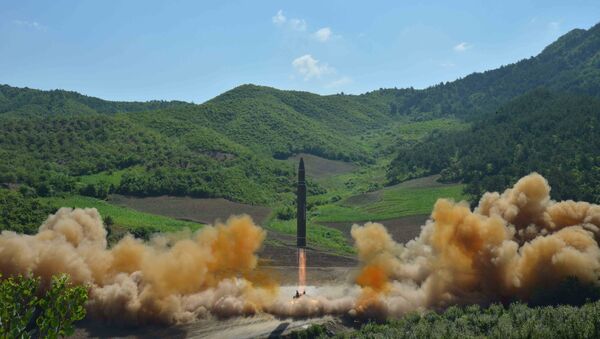In a statement from the South Korea Joint Chiefs of Staff to the outlet, officials noted that they were monitoring the situation.
Yonhap's report came moments after US intelligence reports revealed that the Democratic People's Republic of Korea (DPRK) launched a projectile that appeared to be similar to those launched in previous weeks. Although US officials did not specify how many were launched, they did confirm that the projectiles posed no threat to North America.
Following news of the test, US President Donald Trump told reporters he wasn't worried about the missiles, noting they were short-range and "very standard."
"Short-range missiles, we never discussed that," Trump said, noting that he was focused only on nuclear weapons.
Friday's test was preceded by tests on Wednesday and the previous Thursday, each of which saw two short-range ballistic missiles fired eastward from South Hamgyong Province on the country's easy coast into the Sea of Japan.
Pyongyang's state-owned media outlet Korean Central News Agency described the weapons as a "new-type large caliber multiple launch guided rocket system," which could be described as a ballistic missile but which isn't necessarily so. The South Korean Joint Chiefs of Staff reported that Wednesday's test firing reached 18.6 miles altitude - not enough to leave the Earth's atmosphere and follow a typical ballistic missile trajectory.
Seoul identified the weapons as KN-23, a "road-mobile" system believed to have first displayed in a February 2018 military parade, although it wasn't seen in action until this past May, when Pyongyang resumed its weapons tests. However, US officials have confirmed the short-range weapons don't violate DPRK leader Kim Jong Un's pledge not to resume intermediate and long-range ballistic missile tests.
Kim says the tests are intended to send a message to Seoul not to persist developing new weapons systems and to withdraw from US war games.
Peace talks between the US and North Korea have been stalled for months, but a glimmer of hope has emerged in recent days as news came that representatives from both countries had met at the intra-Korean border and showed favorability toward new negotiations, and US National Security Adviser John Bolton signaled a willingness to return to "working-level discussions on denuclearization" in a Thursday interview with Fox Business' Lou Dobbs.
The two countries have been at war since 1950, with a ceasefire being agreed to in 1953 that formed a fortified demilitarized zone separating US-allied South Korea from the socialist North, then allied to the Soviet Union and China. The two Koreas signed an end-of-war declaration last September, but talks with the US have stalled amid stern refusals by Washington to lower economic sanctions in exchange for further disarmament by Pyongyang.


